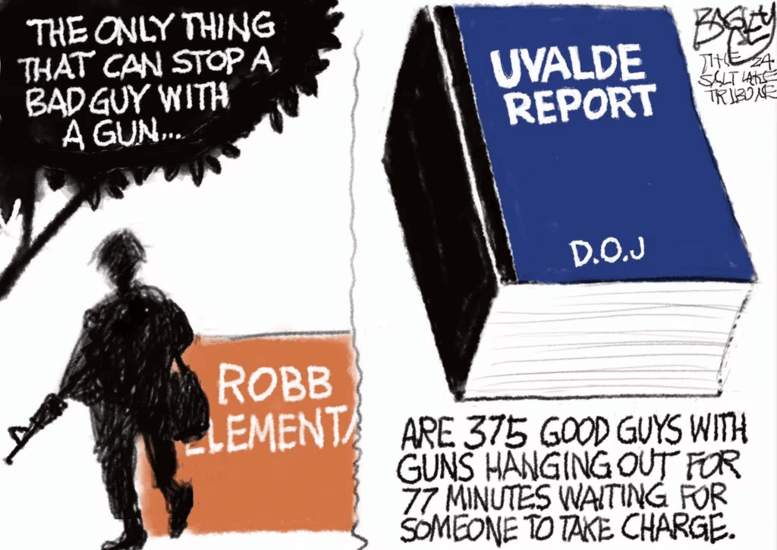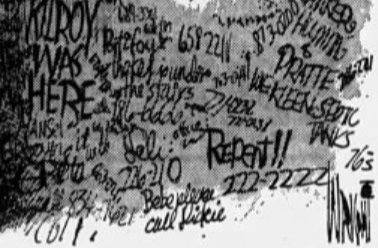CSotD: “… and be capable of reading them”
Skip to comments
At the risk of sounding like an incompetent, unpatriotic university president, I think context matters, and Jefferson’s oft-quoted remark about government without newspapers versus newspapers without government deserves some.
He was writing specifically about Shay’s Rebellion, but he might have been writing about January 6, except that, while Washington had political opponents, most hard-core Tories had decamped for Upper Canada in the wake of the Revolution.
It’s also important to recognize that, while “and be capable of reading them” had to do with his dedication to education, he might also have wished for people to be capable of discerning facts from rumors from fiction from lies.
It was an irritation in his own day and has become a major factor in democratic government today.

So here we are, as Morten Morland so well depicts things, with Nikki Haley attempting to pass Donald Trump in today’s New Hampshire Primary and then into the wider race for the GOP nomination. I particularly like that Haley’s horse is trying to run while Trump’s is simply trotting along, counting not so much on speed but on blocking her.
As far as discernment goes, Trump supporters have dumped a wheelbarrow of TV commercials featuring dubious accusations in Haley’s path and there’s little time to refute them, nor would it matter to people who are looking for confirmation rather than information.
This boldness and brashness has increased in the past decade, but Jefferson would recognize it. It seems to be a permanent part of our process.

Graeme MacKay’s commentary is accurate but a bit puzzling, because, while he correctly cites words upon which elections have turned, they aren’t all factual.
Sarah Palin had spoken of her awareness of foreign relations, remarking, accurately, that there are spots in Alaska (a couple of tiny islands in the Bering Sea) from which you can see Russian territory. Tina Fey spoofed it on Saturday Night Live with the phrase many think Palin actually said.
And Al Gore accurately stated that he had sponsored legislation that helped create the Internet, which was twisted by opponents as part of the “Al Gore lies” trope used to defeat him. Meanwhile, Howard Dean’s odd-sounding shout was the technical result of the impedance in his microphone.
The others happened, however, and the whole collection — lies, errors, accuracies and Trump’s bizarre invulnerability — stand as proof that it doesn’t matter what has been said or done so much as it matters how people process it.
Jefferson believed that competent reporting and educated voters were the key to a functioning democracy, but only until his relationship with Sally Hemings became a news item.
Well, we all have our limits.

John Deering (Creators) suggests that maybe Trump could use a little refresher course in who’s who before he makes his next speech, particularly if a major part of his campaign is claiming that Biden is intellectually impaired.

But, as Jeff Danziger (Counterpoint) notes, Elise Stefanik has leapt to his defense, not only excusing him for mistaking Nikki Haley for Nancy Pelosi but declaring that our jury system is run by a biased media.
Not everyone is buying it, but Trump voters will.

Meanwhile, Rob Rogers might have added a footnote pointing out that Ron DeSantis actually did say the words in the first panel shortly before he dropped out of the race and promptly kissed the ring of his conqueror.
At least, unlike Stefanik, he was being honest.
We’ll see how things go today, but it will almost certainly have more to do with perceptions than with numbers. Gov. Sununu is a popular Republican in a moderate state, but his endorsement of Haley can only go so far, and Trump has already laid the groundwork for screaming “Fraud!” should the count go against him.
He’s cited the 4,000 Democrats who changed affiliation to vote for Haley, which would boost GOP numbers by 1.3%.
If Haley wins by that margin, we’ll know why.
Elsewhere in the Land of Confusion

Mike Lester (AMS) does not overstep with this stark wrap-up of the Justice Department’s report on the Uvalde shootings. As noted the other day, the report doesn’t reveal any major new findings, but simply having the thing released has reminded America of the horrific blundering that made a terrible situation worse.

And not just America. Australian Megan Herbert decries the lack of remedies in the report, by which I would assume that, like other observers, she is sorry it didn’t call for a ban on assault weapons, though the report did, indeed, outline many ways in which the response could have, and should have, been more effective.
BTW, she’s not the only one to cite 575 pages rather than 600, but here’s the report itself and you’ll see it has appendices and an extensive bibliography.
If you promise to read the whole thing, you can cite any page count you wish.

What you won’t find in it is the accusation of cowardice that several cartoonists, including Clay Jones, have leveled at the police. The report does say personal safety should not stop respondents from rushing the shooter, but does not say this was a factor in the lack of response at Uvalde.
Rather, it mentions it in general terms, echoing a report at the time that said officers there, and at similar events elsewhere, have gone slowly because of the fear of being outgunned, despite a declared policy of instant engagement.

Pat Bagley puts things in ironic terms, disputing the fantasy that simply arming everyone will solve the problem, but he is right on target with what the study found: There were plenty of people there, plenty of departments present, but nobody took charge and so everyone awaited orders.
The report blames the school’s security chief specifically for this chaotic non-response.
Anyone responding to an ongoing disaster knows that you need to check in with the incident commander, and that’s true for firefighters, law officers or media. At Uvalde, nobody knew who that was, and the number of people milling around made it hard to find out.
However, the report was intended to determine what happened at Uvalde, and how such events should be handled going forward.
Preventing them is not the job of law enforcement, but of lawmakers.
So it’s up to voters, not to cops.
Vote for candidates who would fit into Dunblane and Christchurch.


Comments 14
Comments are closed.